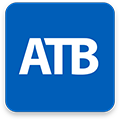As an entrepreneur, you might find yourself juggling daily responsibilities—from managing operations to ensuring customer satisfaction. But if you overlook financial planning, it can impact your business’ long-term success.
Here are strategies to make your money work more efficiently for your company.
Tools and products
Automate what you can to streamline your finances. You can use tools—like QuickBooks, PayPal, Square or options from ATB—for invoicing, payments and bookkeeping to save time and reduce errors. Research savings opportunities that these tools offer and take advantage of discount codes.
Many credit cards offer rewards. For example, the ATB MyBusiness Rewards Mastercard has no annual fee plus one per cent cash back that you can apply to your card's balance or to your deposit account. Review your balance and purchases regularly to understand where your money is going and where you might be able to spend less.
You can balance risk and return with smart investment opportunities. Products such as Guaranteed Investment Certificates (GICs) allow you to have a guaranteed rate of return and offer flexibility on how much you invest and the time period. Different types of GICs suited to both short- and long-term investments are available. Options vary in how tied up your money is and your earning potential, depending on your company’s unique needs.
Another option many business owners use is a high interest savings account (HISA), which often has low or no fees, no terms and offers guaranteed returns with competitive interest rates. HISAs offer more flexibility than GICs as you are able to access your money whenever you need it, making it a better option if your business requires more liquidity and cash on hand.
Set goals
Take time to define clear goals—perhaps increasing revenue 20 per cent by year’s end, expanding to a new location or building a financial safety net starting with $1,000. These clear objectives will guide the rest of the process.
Use professional advice. Talk to your accountant about tax saving strategies and your ATB business advisor to explore solutions best suited to your company.
Budget
Sticking to a weekly or monthly budget is crucial for your company’s success, so set a reminder in your calendar to analyze patterns and notice if you can reduce expenses. Note your revenue, identify fixed and variable costs, and find your profit margin. Interpret that information on your financial statements to establish a healthy, realistic budget. If you can keep track of where your money goes, you can better control it and feel a sense of stability. Are sales slower at a certain time of year you can predict with data?
Is there a way to diversify revenue streams? Relying solely on one source of income can make your business vulnerable to market fluctuations. To combat that, you can apply for relevant grants, expand into new demographics, develop skills through certifications, try out partnerships through networking or invest in mutual funds.
Consider growth
Think long term. What initiatives can you invest in that will contribute to your company’s sustainable growth? There are ways to make debt work for you in the process, and you can earmark a specific percentage of profits towards growth opportunities, like new products or market expansion. Assess the return on investment and compare how that fits with your objectives.
Prepare for the worst
After reviewing your business continuity plan, figure out how much money you would need in different situations when operations are interrupted. Stowing away money in a readily accessible emergency fund—like a savings account—is a prudent way for small business owners to be prepared for anything unexpected, like an economic downturn, health crisis, severe weather event or equipment breakdown. Regularly contribute a certain percentage of your profits until the balance reaches your target.
Recap: Monitor and adjust
Whether you’re just starting out or setting new goals a few years into business ownership, it’s important to regularly reassess your financial strategy. Figure out what’s working and what’s not as you automate the processes you can. Budgeting isn’t one and done; it’s a process of continuously evaluating your financial habits. All the while, make sure you’re tending to your emergency fund so your business is prepared for the unexpected.
